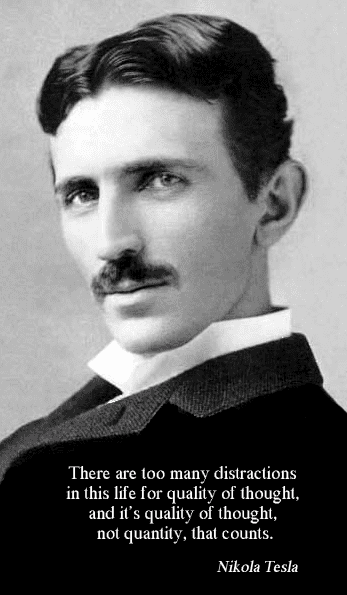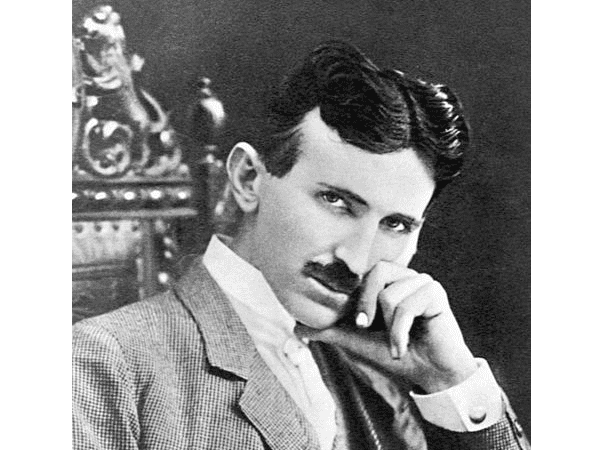Ask most people who was the late 19th and early 20th centuries’ electrical genius and master of inventions, and they will answer: Thomas Edison. However, on 7 January 1943, all alone in room 3327 of the New Yorker Hotel in New York City, an eccentric 86-year-old man died who was the true wizard of electricity: Nikola Tesla. Not only was Nikola Tesla the father of modern radio, he perfected alternating current (AC) electrical power, invented the Tesla coil, and made breakthroughs in a staggering array of fields including radar, X-rays, robotics and nuclear physics.

At the height of his powers Nikola Tesla was recognized as the equal of Thomas Edison (the two once worked together, but became bitter rivals), but in his later years he became so strange that the public increasingly ignored him, contributing to his lack of fame and recognition today. There is no doubt Tesla was a genius, fluent in eight languages, with an astonishing ability to receive visions in which he saw inventions so specifically that every detail was clear in his mind before he ever set pen to paper.
There is also no doubt that the man grew increasingly bizarre, obsessed by such things as the number 3 (he would walk around a block three times before entering a building), pigeons, and a deathly fear of having contact with dirt. Despite making over 700 inventions in his lifetime and some of the most important breakthroughs in the history of science, Nikola Tesla died broke and heavily in debt. He was the very definition of the eccentric genius, or “mad scientist,” yet modern life is dependent on many of the brilliant ideas that sprang from this strange man’s mind.
This old newspaper obituary gives many details of Tesla’s life, career and numerous inventions, and includes this comment from the “Wizard of Electricity”:
There are too many distractions in this life for quality of thought, and it’s quality of thought, not quantity, that counts. ~ Nikola Tesla

Tesla’s obituary reads:
New York, Jan. 8.—Nikolai [sic] Tesla, 86 years old, the electrical genius who discovered the fundamental principle of modern radio, was found dead in his hotel room last night. He died in bed sometime yesterday. Gaunt in his best years, he had lately been wasting away.
Tesla was never married. He had always lived alone, and it is not believed he had any near relatives.
Despite his more than 700 inventions, Tesla was not wealthy. He cared little for money; as long as he could experiment he was happy. Much of the time he did not even have a laboratory, and worked where he lived.
Tesla was the first to conceive an effective method of utilizing alternating current, and in 1888 patented the induction motor which converted electrical energy into mechanical energy more effectively and economically than by direct current. Among his other principal inventions are lighting and the Tesla coil.
“The radio, I know I’m its father, but I don’t like it,” Tesla once said. “I just don’t like it. It’s a nuisance. I never listen to it. The radio is a distraction and keeps you from concentrating. There are too many distractions in this life for quality of thought, and it’s quality of thought, not quantity, that counts.”
Evidently, he did a lot of thinking that never materialized. It was his custom on his birthday—July 10—to announce to reporters the shape of things to come.
On his 76th birthday, he announced: “The transmission of energy to another planet is only a matter of engineering. I have solved the problem so well I don’t regard it as doubtful.”
On another birthday, Tesla predicted that power would soon be projected without wires through the stratosphere.
When he was 78, Tesla announced he had perfected a “death beam” that would bring down a fleet of 10,000 enemy planes 250 miles from a nation’s borders and make millions of soldiers drop dead in their tracks. His beam, he said, would make war impossible.
Tesla was born at Smiljan, Croatia, when it was part of the old Austro-Hungarian Empire. His first electrical invention was the telephone repeater, which he perfected in 1881 while working for the Austrian government.
Three years later, Tesla came to the United States, became a citizen and an associate of the late Thomas A. Edison. Later he established the Tesla Laboratory in New York and devoted himself to research.
Tesla had lived at the hotel where he died for years, and amused himself by feeding pigeons in the nearest park. Several years ago, he hired a boy to take five pounds of corn twice a day and feed it to the pigeons. He said he had found it “more convenient” to use the boy.
Note: FamilySearch International (FamilySearch.org) and GenealogyBank are partnering to make over a billion records from historical obituaries searchable online. The tremendous undertaking will make a billion records from over 100 million U.S. newspaper obituaries readily searchable online. The newspapers are from all 50 states and cover the period 1730 to the present. Find out more at: https://www.genealogybank.com/family-search/
Related Tesla and Invention Articles & Resources:
